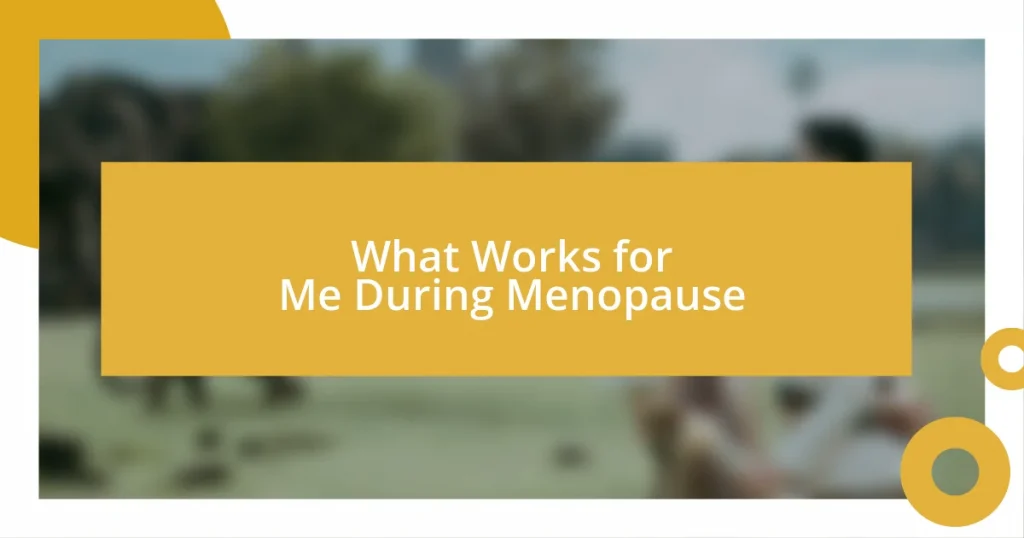Key takeaways:
- Understanding menopause symptoms like hot flashes, mood swings, and sleep disturbances is essential for navigating this life phase.
- Incorporating lifestyle changes such as regular exercise, a balanced diet, and mindfulness practices can significantly improve well-being during menopause.
- Seeking professional support and connecting with others experiencing similar challenges can provide valuable insights and emotional relief.
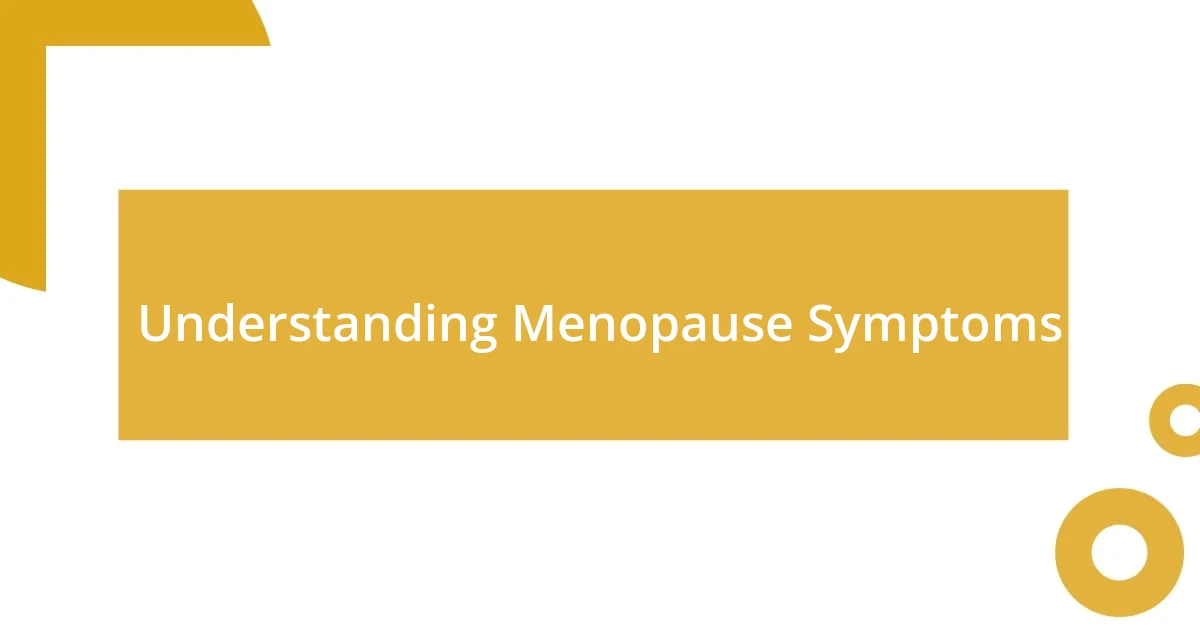
Understanding Menopause Symptoms
Menopause symptoms can be incredibly varied and often catch women off guard. I remember the first time I experienced a hot flash; it felt like someone had turned up the thermostat in a matter of seconds. It’s hard to describe how disorienting that was, and I often found myself thinking, “Is this really happening to me?”
In addition to hot flashes, there’s an emotional rollercoaster that can accompany menopause. For instance, I noticed more mood swings than usual, which sometimes left me feeling frustrated. Isn’t it unsettling to feel like your emotions are on a leash that someone else is tugging on? These mood swings aren’t just annoying—they can affect relationships and daily life in ways we might not anticipate.
Not to mention the sleep disturbances that many women face. I used to sleep like a baby, but suddenly I would wake up in the middle of the night, drenched in sweat. I began to wonder, “Is this what the future holds for me?” Navigating these symptoms can feel daunting, but understanding that they’re a natural part of this life phase helps to put things in perspective.

Effective Lifestyle Changes
Making effective lifestyle changes can make a substantial difference during menopause. I found that incorporating regular exercise into my routine was transformative. Just a brisk walk or yoga session helped alleviate some of my worst mood swings and gave me a much-needed boost in energy. It’s fascinating how something so simple can shift your mindset and even improve sleep.
To make things clearer, here are some lifestyle changes that have worked for me and many others:
- Regular Exercise: Aim for at least 30 minutes of activity most days; it doesn’t have to be intense.
- Balanced Diet: Focus on whole foods, plenty of fruits and vegetables, and stay hydrated.
- Mindfulness Practices: Techniques like meditation or deep-breathing exercises helped me manage stress and anxiety.
- Sleep Hygiene: Creating a calming bedtime routine has improved my sleep quality remarkably.
- Social Connections: I learned the value of talking with friends who are going through similar experiences; it truly helps to share and connect.
Embracing these changes wasn’t always easy, but each step felt empowering. I vividly recall feeling overwhelmed one evening, and just dedicating 20 minutes to stretching and breathing worked wonders. I went from a state of anxiety to utter relaxation, reminding me that small adjustments can lead to significant shifts in how we feel each day.
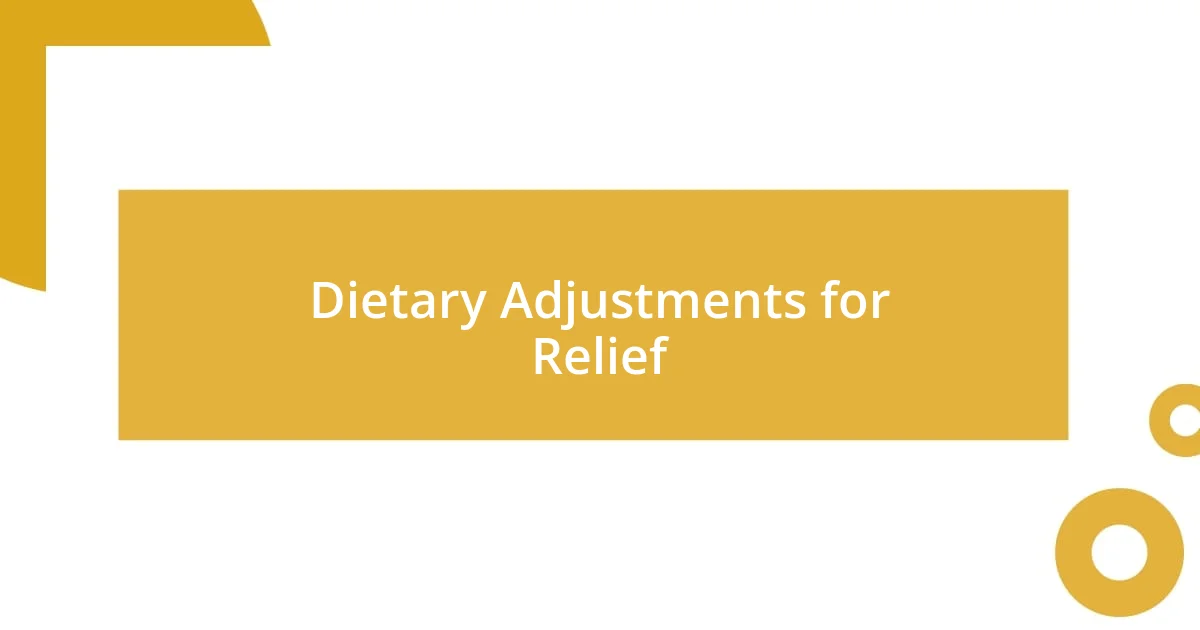
Dietary Adjustments for Relief
Making dietary adjustments during menopause has been a game changer for me. I’ve seen firsthand how what I eat directly impacts my symptoms. For example, incorporating more phytoestrogens—plant-based compounds that mimic estrogen—like flaxseeds and soy products has helped balance my hormones. I remember the first time I added soy milk to my breakfast routine; I felt a noticeable reduction in hot flashes over the following weeks. Have you ever tried tweaking your diet to see a change? I think you might be surprised by the results!
Another adjustment that has worked wonders for me is reducing sugar and processed foods. Initially, I was reluctant to give up my late-night sweets, but cutting back led to more stable energy levels throughout the day. Instead of reaching for a sugary snack, I started opting for nuts and berries, and the difference was incredible. My mood stabilized, and I no longer experienced those drastic energy crashes. It’s amazing how a few conscious choices can pave the way for feeling better!
Lastly, staying hydrated is something I can’t emphasize enough. I used to overlook how much water I drank, especially if I was busy, but dehydration seemed to exacerbate my symptoms. I began carrying a water bottle everywhere, aiming for at least eight glasses a day. The clarity it brings to my thoughts and the reduction in headaches alone make it worthwhile. What small dietary changes have you considered making? Sometimes, the smallest adjustments can lead to remarkable improvements.
| Food Category | Benefits |
|---|---|
| Phytoestrogens (flaxseeds, soy) | Mimics estrogen, helps balance hormones |
| Whole grains | Stabilizes energy levels |
| Fruits & Vegetables | Rich in vitamins and antioxidants |
| Nuts & Seeds | Provides healthy fats and protein to keep you full |
| Hydration | Reduces headaches, improves energy |
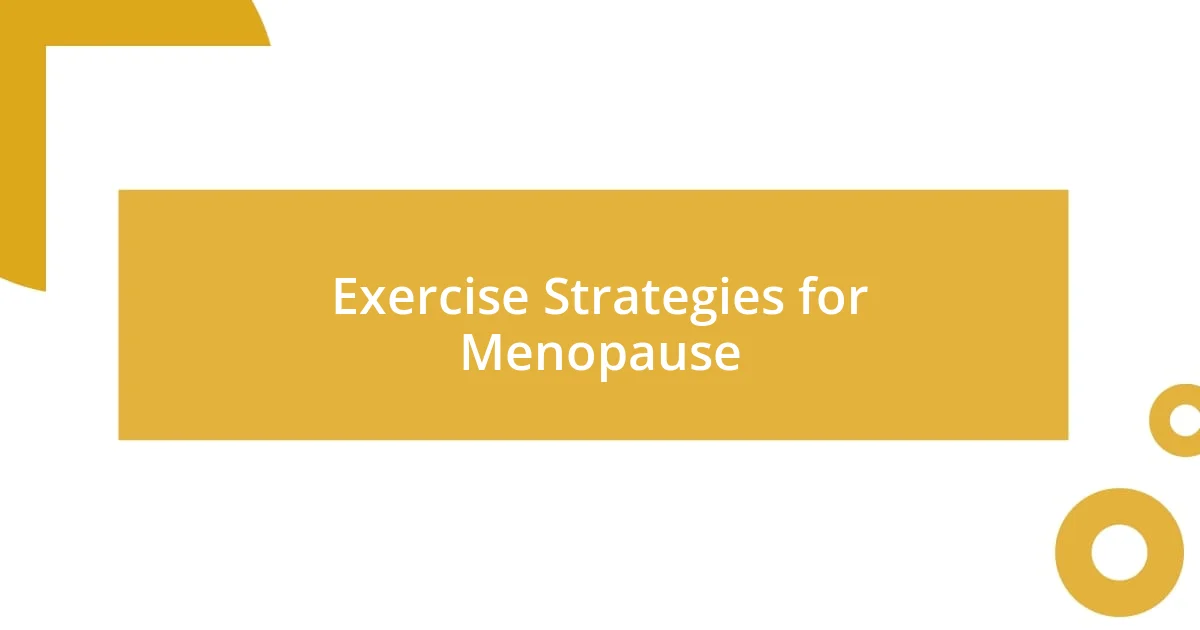
Exercise Strategies for Menopause
Finding the right exercise strategies during menopause has been key for me. Early on, I discovered that mixing activities was crucial. I often alternate between strength training and low-impact cardio like swimming, which not only helps maintain muscle mass but also keeps my joints happy. Have you ever tried varying your routine? It prevents boredom and makes staying active feel less like a chore.
I remember the first time I joined a group exercise class. Not only did I break a sweat, but the camaraderie was refreshing. Sharing those moments with others going through similar experiences made a huge difference in my motivation. It’s incredible how working out with friends not only keeps you accountable but also allows for genuine connections. That sense of community felt empowering, and I often find myself laughing through the tough parts.
Incorporating mindfulness into my exercise routine has been transformative as well. I’ve embraced activities like yoga, where focus on breathing calms my racing thoughts. There are days when emotions can feel overwhelming, and just pausing to stretch and breathe brings clarity. Have you thought about how movement can be both physical and mental? It’s a reminder that this journey isn’t just about physical health but emotional well-being, too.
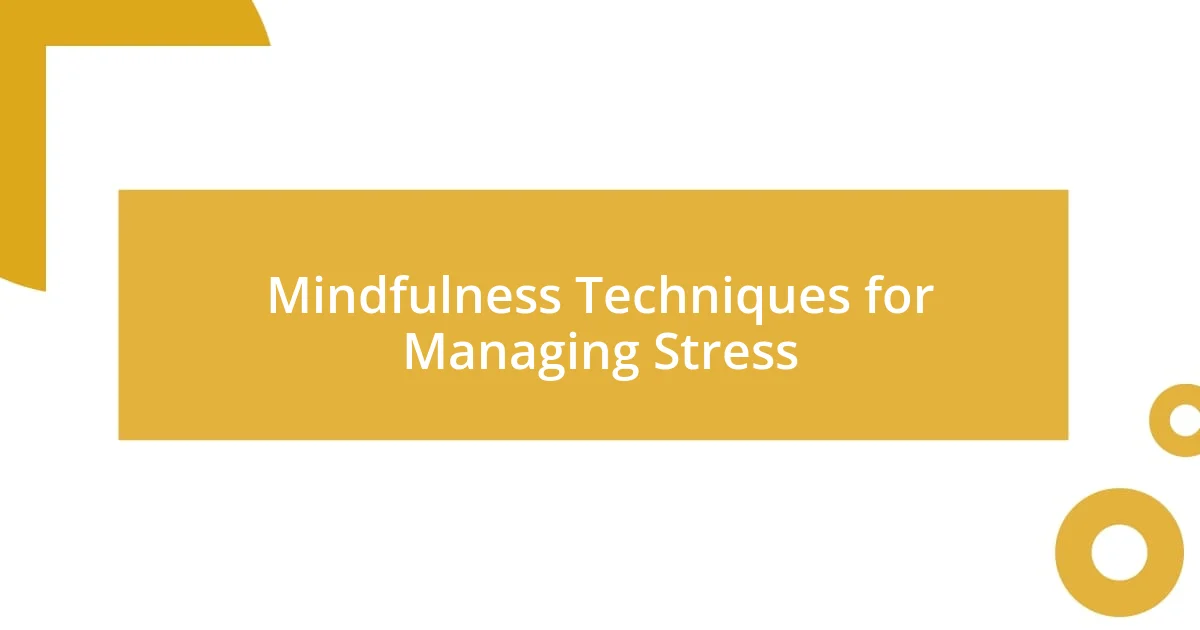
Mindfulness Techniques for Managing Stress
Mindfulness techniques have truly become my anchor during stressful times, especially through menopause. For me, setting aside just a few minutes each day for deep breathing exercises has made a world of difference. I remember one particularly hectic morning; I took a moment to close my eyes, inhale deeply, and exhale slowly. Immediately, the weight on my chest lightened, making it easier to face the day. Have you ever tried just pausing to breathe? Sometimes, the simplest action can have a profound impact.
Meditation has also played a significant role in managing my stress. Initially, I was overwhelmed by the thought of trying to quiet my mind, but I found that guided meditations helped me ease into the practice. I recall the first time I used a meditation app; listening to calming music while focusing on a simple mantra was incredibly soothing. It felt like giving myself permission to let go of racing thoughts and just be present. Have you explored any meditation styles? Finding what resonates with you can create a peaceful escape amid chaos.
Visualization techniques are another powerful tool I’ve adopted. Whenever I feel stress creeping in, I picture a tranquil place—like a quiet beach with gentle waves lapping at the shore. This mental imagery instantly transports me away from my worries, fostering a sense of peace. I often think about how our minds hold so much power over our feelings; isn’t it fascinating how simply imagining a serene scene can help shift our mood? When was the last time you envisioned a safe haven to take a mental break? Embracing these mindfulness practices has not only helped mitigate stress but has also been a beautifully transformative journey for my well-being.

Natural Supplements and Remedies
Natural supplements have been a game-changer for me during menopause. I vividly remember stumbling upon black cohosh at a health store. Skeptical but curious, I gave it a try, and within weeks, I noticed a significant reduction in night sweats. Have you ever felt like you had nothing to lose but everything to gain? That feeling of relief was a revelation, and I couldn’t help but share my experience with friends who were also seeking solutions.
Another supplement that has caught my attention is omega-3 fatty acids. Initially, I incorporated them into my diet for their heart health benefits, but I was pleasantly surprised to discover how they helped with mood swings and irritability, too. I’d find myself in the middle of a hectic week, feeling overwhelmed, and then I’d remember to take my daily fish oil capsule. It’s almost like a little moment of self-care, a reminder that I’m doing something good for my body and mind. Have you explored the connection between diet and emotional well-being? It’s fascinating how the right nutrients can support us during challenging times.
Lastly, I’ve tried incorporating herbal teas like chamomile and peppermint into my nightly routine. On a particularly rough day, I brewed a cup of chamomile and sank into my favorite chair. The warmth of the tea, combined with the calming aroma, started to ease away the tension. I found myself wondering how something as simple as a warm drink could have such a comforting effect. Have you ever found peace in a small ritual? Building these moments into my day has not only provided physical relief but has also created a sense of tranquility that lingers long after sipping that last drop.
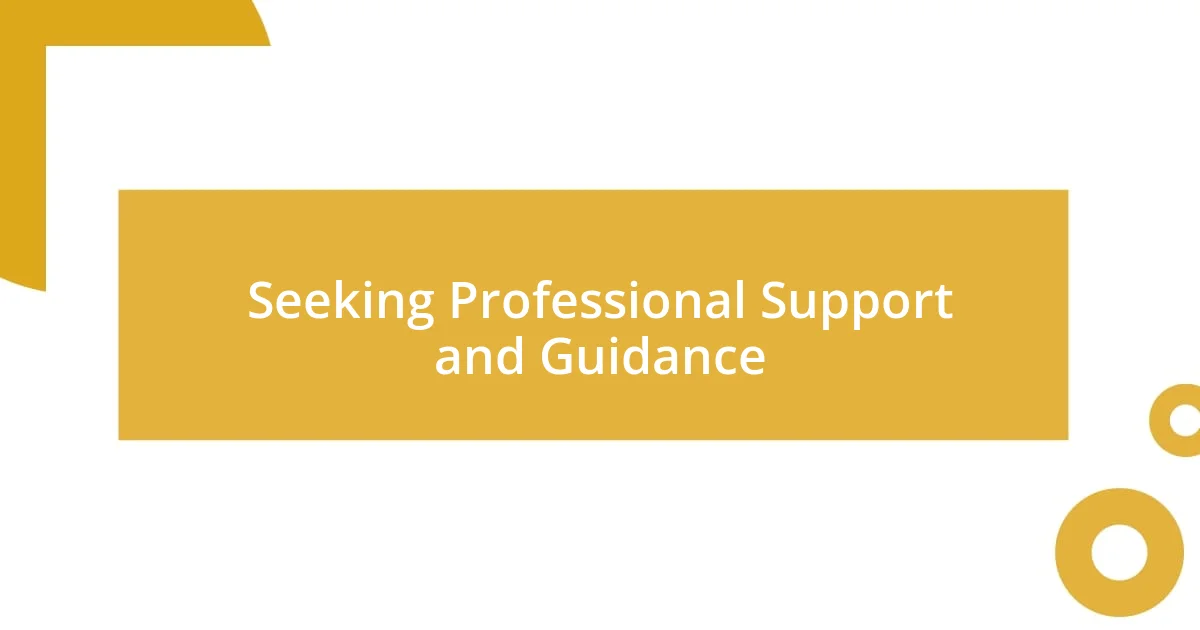
Seeking Professional Support and Guidance
Seeking professional support during menopause has been invaluable for me. I remember my first visit to a specialist; I felt a mix of anxiety and hope, uncertain of what to expect. That session turned out to be enlightening—we discussed symptoms, possible treatments, and coping strategies tailored to my needs. Have you considered the wealth of knowledge professionals can offer? It’s incredible how much clarity a few expert recommendations can bring.
I’ve also found group therapy sessions helpful along the way. Listening to others share their experiences often reinforces that I am not alone in this journey. One woman’s story about navigating mood swings struck a chord with me; it reminded me that every single experience is a thread woven into the rich tapestry of menopause. Do you often seek connection in shared experiences? It’s comforting to realize that these feelings and challenges are familiar to many and that we can support each other through them.
Furthermore, I’ve learned that finding the right healthcare provider is crucial. I visited a few before I found one who truly understood my concerns and took the time to listen. The moment I shared my struggles with hot flashes and sleepless nights, her empathetic nod made me feel validated. Have you experienced the relief of finally being heard? That supportive relationship has made a significant difference in how I approach this phase of life, driving me to pursue healthier choices and ultimately fostering a deeper self-awareness.









